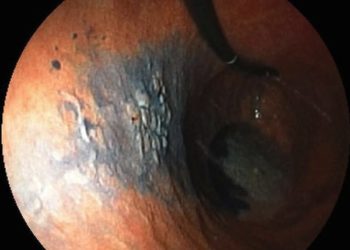Asymptomatic H. pylori eradication decreased gastric cancer in Asian populations
Image: PD
1. Meta-analysis of trials involving eradication of Helicobacter pylori (H. pylori) in asymptomatic individuals showed significant decrease in gastric cancer incidence compared to placebo.
Evidence Rating Level: 2 (Good)
Study Rundown: Infection from H. pylori has been strongly associated with an increased incidence of gastric cancer. However, the use and benefit of screening and eradication of H. pylori in asymptomatic, healthy individuals is unclear. The authors of this paper performed a meta-analysis of randomized control trials (RCT) analyzing the efficacy of H pylori eradication therapy on incidence of gastric adenocarcinoma. In total, 6497 individuals across six RCTs were included in the analysis. The meta-analysis demonstrated a significantly decreased incidence of gastric cancer in individuals that received eradication therapy versus controls (relative risk: 0.66, 95% CI 0.46-0.95). Utilizing previously calculated lifetime risks of gastric cancer, the number needed to treat for eradication therapy were as low is 15 for Chinese men and 245 for US women. The strength of the study were the strict search and exclusion methodology. However, all trials included in the meta-analysis were performed in China or Japan, so the data is unlikely to be generalizable to populations outside of Asia. This paper supports the utilization of H. pylori eradication health policies in areas for high risk of gastric cancer.
Click to read the study in BMJ
Relevant Reading: Helicobacter pylori Infection and the Risk of Gastric Carcinoma
In-Depth [meta-analysis]: This meta-analysis identified 9 articles, representing six RCTs that met the inclusion criteria. All six RCTs were performed in either China or Japan. The duration of follow-up ranged from 5 to 14.7 years. 51/3294 (1.6%) receiving eradication therapy developed gastric cancer compared to 76/3203 (2.4%) on placebo (RR: 0.66, 95% CI: 0.46-0.95). Additional sub-analysis demonstrated no benefit in eradication therapy in reducing mortality of gastric cancer (RR: 0.67, 95% CI 0.40-1.11) nor all-cause mortality (RR: 1.09, 95% CI: 0.86-1.38). Interestingly, there was a significant benefit in the use of eradication therapy alongside antioxidant/vitamin use on the incidence of gastric cancer (RR: 0.52. 95% CI: 0.31-0.87).
More from this author: Gender differences in white matter integrity may affect post-traumatic brain injury, Pulse oximetry screening improved detection of congenital heart disease in China, Stool DNA testing may improve screening sensitivity of colorectal cancer,Radical prostatectomy may trump radiotherapy in non-metastatic prostate cancer, Screening mammography may not decrease overall mortality in women ages 40-59
©2012-2014 2minutemedicine.com. All rights reserved. No works may be reproduced without expressed written consent from 2minutemedicine.com. Disclaimer: We present factual information directly from peer reviewed medical journals. No post should be construed as medical advice and is not intended as such by the authors, editors, staff or by 2minutemedicine.com. PLEASE SEE A HEALTHCARE PROVIDER IN YOUR AREA IF YOU SEEK MEDICAL ADVICE OF ANY SORT.







